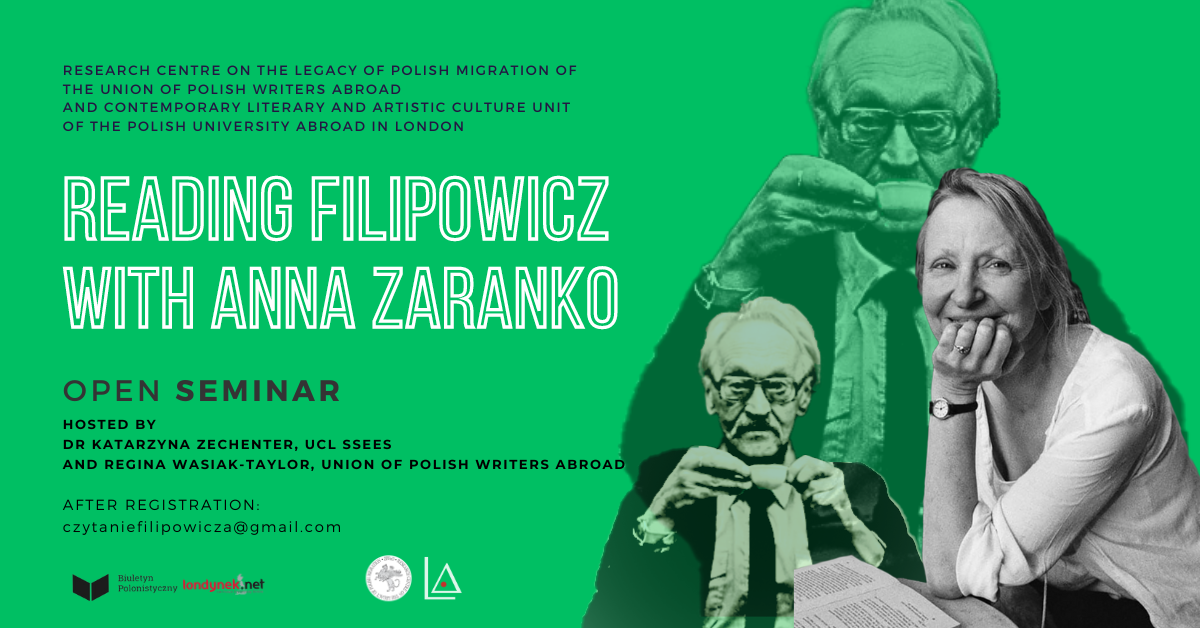Event
'Cat in the Wet Grass' by Kornel Filipowicz – between reading and translation
You are cordially invited to the fourth meeting in the series 'Reading Filipowicz'. This time we will enter into the fascinating world of Filipowicz's works in conversation with Anna Zaranko, who translates Filipowicz's works into English.

Reading Filipowicz with Anna Zaranko
The meeting with the translator of The Memoir of an Anti-hero into English is the next in the series of open seminars 'Reading Filipowicz'. The series is organised by the Research Centre on the Legacy of Polish Migration (ZPPnO), the Contemporary Literary and Artistic Culture Unit and the Computer Science Unit of the Polish University Abroad (PUNO) in London. The project is led by Dr Justyna Gorzkowicz.
- The meeting will be hosted by Regina Wasiak-Taylor and Dr Katarzyna Zechenter
About the translator
Anna Zaranko was born in England to Polish parents. She took a First Class degree in Russian from the University of Durham and went on to hold two British Council scholarships at the Jagiellonian University in Krakow. She did research towards a D.Phil. in Polish literature at Oxford University (where she was also an assistant editor at POLIN – a journal of studies in Polish Jewry) but moved into publishing, alongside freelance editing, writing, reviewing, and translating (from Polish, Russian, and French). In 2015, she was an American Literary Translators’ Association Mentee, working with Bill Johnson. In 2020 Anna received Found in Translation Award for her translation of The Memoir of an Anti-hero by Kornel Filipowicz, published by Penguin Modern Classics in 2019. Her other translations include further works by Kornel Filipowicz, i.e. the short stories When They Come in Our Dreams by Kornel Filipowicz (Przekrój Magazine, 2019) and Cat in the Wet Grass (2023). Cat in the Wet Grass has been translated for the Penguin Book of Polish Short Stories, selected by Antonia Lloyd-Jones, due out in January 2025. It will include approximately 39 stories dating back about a hundred years to the present day and hopes to provide the English-language reader with a good cross-section of Polish writing. It includes nine stories that have been previously published in other collections or journals, and 30 that have never been translated into English before. It includes 13 (one third of the book) by women writers. Some of the writers are famous, others have been forgotten. With the kind permission of the publishers and editors, Filipowicz's short story will be presented at the next seminar in the "Reading Filipowicz" series.
About the meeting hosts
- Regina Wasiak-Taylor, Chair of the Union of Polish Writers Abroad (ZPPnO), vice director Director of the Research Center on the Legacy of Polish Migration at the ZPPnO, Editor-in-Chief of the London-based "Pamiętnik Literacki", author of books on emigration, active participant in international academic conferences, and animator of the cultural and literary life of the Polish diaspora in the UK. She edits books, promotes Polish authors and translators of Polish literature, and moderates international literary and academic meetings.
- Dr Katarzyna Zechenter is Associate Professor of Polish Literature and Culture at the UCL School of Slavonic and East European Studies and Vice-Director of the Research Centre on the Legacy of Polish Migration at ZPPnO. She graduated from the Jagiellonian University in Krakow with an MA in Polish Literature. After further studies at the University of Michigan, Ann Arbor, she obtained a second MA (1992) and a PhD (1996) and later taught as an assistant professor at the University of Kansas, Lawrence, in the Department of Slavic Languages and Literatures. In 2000 she joined the UCL School of Slavic and East European Studies, where I teach courses on Polish Literature, Cinema in Eastern Europe and Polish Cinema, as well as a course on Polish Jewry (Beyond Stereotypes: Jews in Polish Culture).
- Attend the meeting after registering with ZOOM: https://us06web.zoom.us/meeting/register/tZ0ofuyqpj0rHdDnydK3aIMbO05dvTXGn5G5
- We also encourage you to contact us by email: czytaniefilipowicza@gmail.com
For those registered for the meeting, the organisers will send the Filipowicz short story to be discussed in two language versions (Polish and English). The meeting will be held in English
Information
See also
Bednarczyk's Press and Feliks Topolski: Artists under Waterloo Arcades. Guided Tour
Welcome to a guided tour exploring the history of Polish art and emigration in the dynamic and vibrant context of London. This bilingual event is organised by the Research Centre on the Legacy of Polish Migration and Blue Point Art Gallery. We invite you to join us for a series of engaging conversations. Discover how the social responsibility of academic research, digital humanities and interdisciplinarity can enhance the contributions of the Polish community to London's cultural landscape.
Piętno Zagłady: Wojenna i powojenna historia oraz pamięć żydowskich dzieci ocalałych w Polsce by Joanna Beaty Michlic
Prof. Michael Fleming and dr Wojciech Rappak invite on 8th December 2021 at 6.15 PM GMT, as part of the seminar in cycle “Twentieth Century Polish History”, a book launch by Joanna Beata Michlic
Schulz and imaginative spaces by Eliza Kącka / Polish Literary Culture Series: Digital Lectures Part I
Contemporary Literary and Artistic Culture Unit of the Institute of European Culture at the Polish University Abroad in London has the pleasure to invite you to a series of digital sessions. We will start with a lecture by Dr. Eliza Kącka in the formula of open access.
Władysław Reymont through the prism of film adaptations (Andrzej Wajda and others) - A lecture and multimedia presentation by Prof. Tomasz Żukowski
On June 8, Prof. Tomasz Żukowski will examine Reymont’s texts and their adaptations in the context of the discussion about how national history relates to the history of social groups and the conflicts between them. The lecture is presented in cooperation with the Institute of Literary Research of the Polish Academy of Sciences and is part of the Tadeusz Solowij Lectures of the Kosciuszko Foundation.